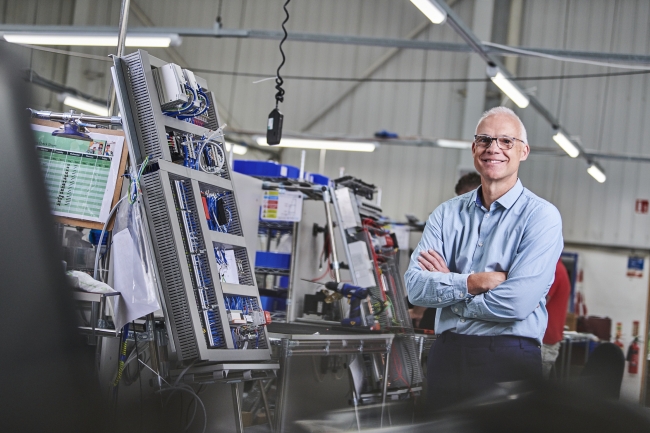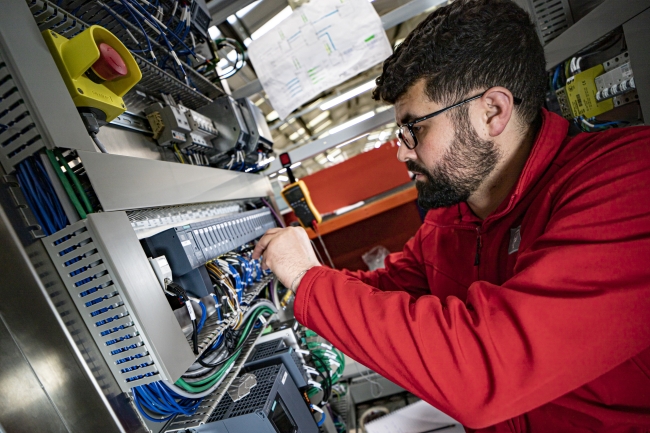7 minute read • published in partnership with PP Control & Automation
Insight: Manufacturers should act now to achieve strategic independence
Tony Hague, CEO of PP Control and Automation, explores the importance of industry taking destiny into its own hands and why waiting for government to get its act together is never the best course of action.
“In the current climate of political and economic uncertainty…”
Phrases like this have become the pre-requisite line to so many manufacturing topics since Brexit and the pandemic. It feels most conversations will be proceeded by a disruption of some kind, or a shortage of something, a gap in, or a lack of… supply chain, skills or people the most popular.
All common and challenging topics without a doubt. But we’ve become a community looking outwards to ease our ‘uncertainty’ when we should have, in fact, been looking within the whole time.
We can’t wait on all external factors to calm, or a government to care. We can’t wait around for a directive, or a miraculous shift in how our work is valued. And we definitely can’t be passive.
The manufacturing community wears resilience like a badge of honour because of the sheer number of times it has had to fight its own corner or paddle its own canoe. But that spirit shouldn’t be reserved only for overcoming difficult situations, it should be leveraged to cultivate our own strategic independence.

CEO of PP Control and Automation, Tony Hague / Picture: PP Control and Automation
Let’s presume that when it comes to industry, a lax government will continue to be exactly that – lax. No matter what way the July 4th general election may tip the balance of power, the matter of alignment with industry will still likely be askew. Would it not be more beneficial to instead take proactive steps to securing our own future?
“A stitch in time saves nine,” as the saying goes.
Strategic independence refers to a company’s ability to formulate and execute its strategy autonomously, without excessive reliance on external forces, such as inadequate government policies and economic aid. For UK manufacturers, this pursuit may be crucial for several reasons.
Unpredictable Politics
Politics in the UK has been anything but predictable. When it’s as unpredictable as it feels today, we’re prone to start using it as an excuse, triggering our frustrations at a government with no long-term industrial strategy. They’ll become the punching bag that’s closest, so that’s the thing we’ll hit out at.
I’m not defending government or asking you to, that’s not in my nature. Instead, I’m suggesting that we all make a conscious choice to not rely on them, because I think it will encourage our creative and innovative industry-wide DNA to take over. Proactivity will develop a resilience that propels us towards an ambitious vision, rather than act as a counterattack that helps us survive.
From Brexit to fluctuating trade relations, manufacturers have indeed had to navigate a sea of uncertainty – and we’ll use terms like this – uncertainty, to summarise every situation; not just the fallout of Brexit and fighting the pandemic, but everything in between, from a skills shortage to the cold hard reality of broken supply chains. The latter is really a result of companies chasing the perceived lowest cost – a choice too many made long before Brexit and Covid. Supply chains were always fragile, and the perfect storm of events were always destined to trigger their downfall.
But I wonder, can you remember the last time politics and its relationship with manufacturing felt in any way ‘certain’?
We can always dig through history books to find the last impression of some kind of alignment, but do we need to? If like me, you’ve spent the past 30 years in manufacturing, you’ll know that misalignment between industry and politics has been the one constant we can all rely on.
You could also argue that the last significant period when UK manufacturing and politics seemed closely aligned was during the post-World War II era. During this time, the government pursued a policy of nationalisation of key industries including coal, steel, and railways, which was part of a broader strategy to rebuild the British economy.

Picture: PP Control and Automation
Post 1950s, the relationship between politics and manufacturing was fraught with attempts at intervention and support, but also characterised by a lack of a coherent long-term strategy to stabilise and grow the manufacturing sector effectively.
The recent periods of uncertainty, especially post-2008 financial crisis and following the referendum in 2016, have only heightened this sense of misalignment. The Brexit process, in particular, highlighted a lack of clear policy direction that could have reassured manufacturers about their future, especially concerning trade relations and regulatory frameworks.
History tells us that manufacturers have often expressed the need for a more cohesive, long-term industrial strategy that would include stable trade agreements, consistent regulatory environments, and support for innovation and adoption of new technologies.
The perceived effectiveness and continuity of any policies or promises in recent times have been a matter of debate, but for most reading this, I would hazard a guess that they’ll sit quite firmly on one side of that argument – we’re still very much misaligned.
Aiming for Strategic Independence
So, whilst so many pour bold efforts into lobbying government and championing industrial change, those efforts could be pivoted to this idea of strategic independence.
I’m not sure if this view is contrarian or not but think of the benefits: from driving innovation and competitive advantage, attracting investment and tailoring operations to market needs, to being too influential to ignore that this independence is what leads to effective policy change.

Picture: PP Control and Automation
Here’s another saying you’ll recognise, “Fortune favours the bold.”
Strategic independence in R&D for example could allow companies to better explore niche markets and develop proprietary processes, all of which can offer significant competitive advantages. Investors are attracted to companies that demonstrate vision, agility, and the capability to thrive in volatile markets. By showing that we can operate successfully and grow without waiting for government intervention, we can attract both domestic and international investors looking for viable opportunities in our sector.
The needs of manufacturing businesses vary widely depending on factors like product or service type, supply chain logistics, and customer demographics. A one-size-fits-all approach that might eventually emerge from a government strategy may fall short on matching the effectiveness of a tailored strategy developed from an intimate understanding of one’s business and market environment.
Strategic independence empowers firms to make operational adjustments that are directly aligned with their business goals and customer needs. We should consider and clearly understand processes, such as market orientation, because it is a proven growth hack, yet so few manufacturing businesses understand it as a cultural mandate. Market orientation is the foundation underlining the ‘success profile’ of many of the world’s most effective, efficient, and resilient companies – companies that forged their own unique ways forward.
And that piece on policy change? Successful strategies and technologies often become case studies or models that policymakers look to when designing regulations and incentives, giving proactive companies a voice in shaping them for industry.
How, then, can UK manufacturers cultivate this strategic independence?
Innovation, Risk, Skills and Data
We’ll need to enhance innovation capacities, so investing in technology and R&D is fundamental. This might mean allocating a higher proportion of the budget to innovation, partnering with technology providers, or setting up dedicated innovation labs.
Additionally, fostering a culture that values creative thinking and problem-solving across all levels of the organisation can lead to differentiating, competitive advantages. This will require a shift in how businesses typically support innovation and R&D by being openly less risk adverse, and find comfort in learning from the process, rather than trying to protect themselves from potential failures.
There are situations where risk plays a more significant role in different ways – strategic independence involves minimising vulnerabilities in supply chains for example. For manufacturers, this means diversifying supply sources and exploring local options to reduce dependency on imports. Building strong relationships with a variety of suppliers can provide flexibility and security in changing economic landscapes.

Picture: PP Control and Automation
We can do much more to develop skills and expertise internally. Investing in workforce development is obviously crucial to improve productivity and innovation capacity, not to mention bridging skills gaps and keeping employees engaged. Offering regular training and development programmes, whilst also collaborating with educational institutions to deliver tailored courses, will help build a more competent and loyal workforce.
We’re in a digital age, where data is abundant and invaluable. Manufacturers should leverage data and analytics and invest in capabilities to gain insights into market trends, customer preferences, and operational efficiencies. This knowledge will drive smarter, evidence-based decision-making.
Whilst pursuing independence, it is also wise to maintain strong relationships and build your own self-contained networks and collaborative approaches to business improvement, market targeting, and the imperatives of ESG, especially in engaging with local communities.
And just because you’re developing your own strategic independence, it doesn’t mean that relationships with industry associations, and even governmental bodies are avoided – quite the opposite. When these relationships are built into strategic plans, they can provide support, resources, and vital market intelligence.
For UK manufacturers, the path to longevity and success lies in strategic independence. By investing in innovation, building flexible supply chains, developing internal skills, utilising data, and maintaining strong stakeholder relationships, manufacturers can secure their future.
These musings advocate for a proactive, dynamic approach where UK manufacturers drive their destiny, leveraging their strengths and innovations to not only survive but thrive, irrespective of the pace or direction of government policy.
I’ll leave you with one more saying, “If you want something done right, do it yourself.”
